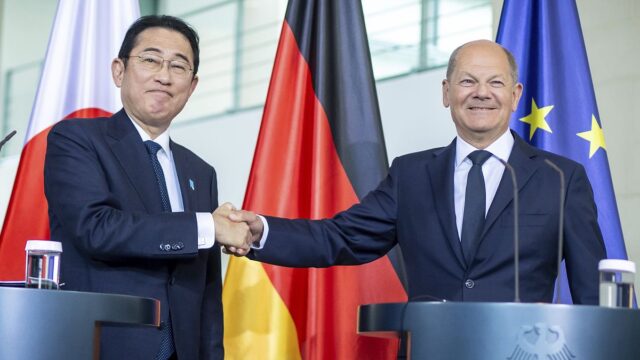Both sides said their countries would create an economic security framework amid fears over what they see as China’s overproduction of electric vehicles and other key products through massive subsidies.
German Chancellor Olaf Scholz and Japanese Prime Minister Fumio Kishida have agreed boost security cooperation in the Indo-Pacifica region that has seen an increase China’s military assertiveness.
“As the security environment in the Indo-Pacific region is under increased threat, due to the movement of China and North Korea, cooperation between Germany, with whom Japan shares similar valuesis becoming more and more important,” Kishida stated.
During the talks in Berlin, Kishida and Scholz also confirmed that their countries would create a framework of economic security amid fears over what they see as China’s overproduction of electric vehicles and other key products through massive subsidies.
As part of efforts to accelerate bilateral cooperation, the two leaders also agreed hold high-level intergovernmental talks in Germany, possibly next year, to address a wide range of global and regional issues.
“Today we agreed to establish a new dialogue on economic security. And we have decided to hold joint intergovernmental consultations again next year, this time in Germany“said Scholz.
Scholz also stated that, Despite the distance between both countries, Japan and Germany have “many things in common” and both leaders agreed that the defense and foreign ministers of the two countries will soon hold “two plus two” security talks in Japan.
Kishida traveled to Germany after attending the 75th NATO summit in Washingtonwhich concluded on Thursday.
In his conversations with Scholz, he expressed his ‘grave concern’ over North Korea’s growing military cooperation with Russiawhich Scholz called a “clear violation of UN sanctions.”
Japan also believes that the escalation of tensions between China and Taiwan It is one of the most serious security challenges, since Beijing considers the self-governed democratic island to be a renegade province that must be reunified with the mainland, by force if necessary.
Meeting between Scholz and Kishida
Kishida and Scholz met on the occasion of the entry into force, on Friday, of the acquisition and cross services agreement (ACSA) between its countrieswhich simplifies the process of distributing food, fuel and ammunition between the Japanese Self-Defense Forces and the German army.
A German frigate is scheduled to stop in Japan this summer, while a Maritime Self-Defense Forces training squadron is scheduled to stop in Hamburg, Japanese officials said.
In terms of economic security, Japanese and German leaders discussed how to work together to strengthen a free and fair global trade orderwhile confirming their cooperation to strengthen the supply chains of hydrogen, semiconductors and critical mineral resources.
Scholz also said that he believed a possible agreement between the European Union and China about tariffs on Chinese electric vehicles.
The EU is imposing provisional tariffs of up to 37.6% to electric vehicles imported from China, raising tensions with Beijing in the EU’s biggest trade case to date.
“Always We will insist that conditions are fair for all parties and that is what is being discussed right now between the European Union and China,” Scholz said.
These statements come a day after Interior Minister Nancy Faeser said that Germany will ban the use of critical components made by Chinese companies Huawei and ZTE in fundamental parts of 5G networks of the country in two steps starting in 2026.
Germany, which is the largest economy in Europe, has been reflecting for some time on what to do with the components manufactured by Chinese providers in their next generation mobile networks.
Faeser said that Huawei and ZTE critical components will be excluded from 5G core networks by the end of 2026while “critical management systems” of the two manufacturers in 5G access and transport networks They must be replaced at the end of 2029.







